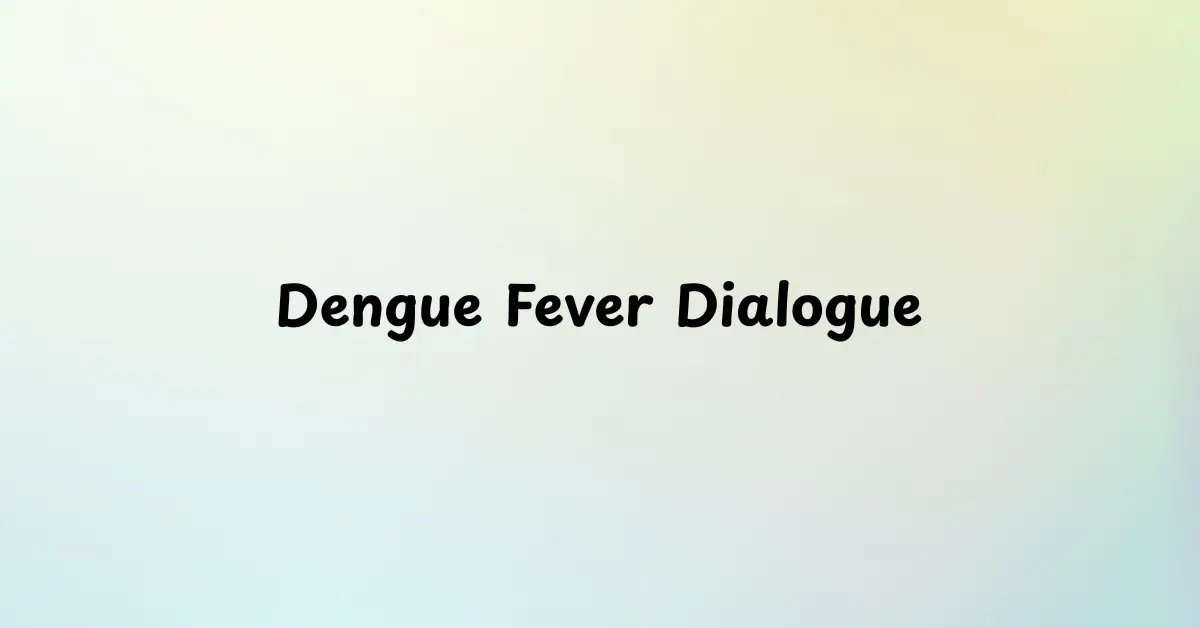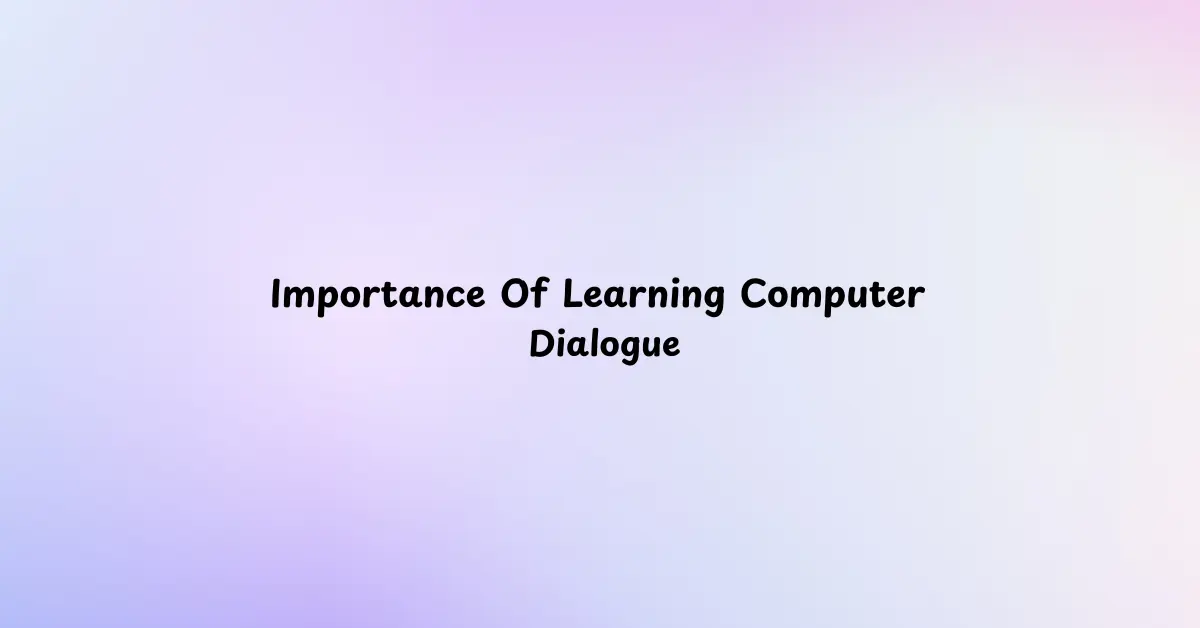
Doctor And Patient Dialogue
Hi everyone! We’re going to learn about fevers today by reading a “doctor and patient dialogue.” It’s like listening to what they say when someone feels sick. This will help you know what to do if you think you have a fever and when you need to tell a grown-up. Let’s start today’s lesson! Q. Write A Dialogue Between Doctor And Patient Doctor And Patient Dialogue For HSC Patient: Hi hello, how are you? Doctor: I am fine, and you? Patient: I’m not feeling very well. I think I have a fever. Doctor: I’m sorry to hear that. When did you start feeling sick? Patient: Two days ago. I feel hot and cold. I also sweat a lot at night. Doctor: Do you have any other symptoms? Like a sore throat or body aches? Patient: My body feels sore, and I’m very tired. But my throat is fine. Doctor: Do you have headaches or stomach issues? Patient: Yes, I’ve had bad headaches. But my stomach is okay. Doctor: Were you around anyone who was sick recently? Patient: Yes, I saw a friend last week who wasn’t feeling well. Doctor: It sounds like a viral fever. Rest as much as you can. Drink lots of water to stay hydrated. Take paracetamol if the fever is high. If you still feel unwell after two days, come back to see me. Patient: Thank you, doctor. Doctor: You’re welcome. Take care, and I hope you feel better soon! Doctor And Patient Dialogue Dialogue For SSC Patient: Hi hello, how are you? Doctor: I am fine, and you? Patient: I’m not feeling very well. I think I have a fever. Doctor: I’m sorry to hear that. When did you start feeling sick? Patient: Two days ago. I feel hot and cold. I also sweat a lot at night. Doctor: Do you have any other symptoms? Like a sore throat or body aches? Patient: My body feels sore, and I’m very tired. But my throat is fine. Doctor: Do you have headaches or stomach issues? Patient: Yes, I’ve had bad headaches. But my stomach is okay. Doctor: Were you around anyone who was sick recently? Patient: Yes, I saw a friend last week who wasn’t feeling well. Doctor: It sounds like a viral fever. Rest as much as you can. Drink lots of water to stay hydrated. Take paracetamol if the fever is high. If you still feel unwell after two days, come back to see me. Patient: Thank you, doctor. Doctor: You’re welcome. Take care, and I hope you feel better soon! Doctor And Patient Dialogue For Class 6 7 8 9 10 Patient: Hi hello, how are you? Doctor: I am fine, and you? Patient: I’m not feeling well. I think I have a fever. Doctor: I’m sorry to hear that. When did it start? Patient: It began two days ago. I feel hot, then cold. Doctor: Do you have other symptoms, like body pain or cough? Patient: My body is sore, and I feel tired. But I don’t have a cough. Doctor: Do you have headaches or any stomach issues? Patient: I have some headaches, but my stomach feels okay. Doctor: Were you near anyone sick recently? Patient: Yes, a friend I met last week was sick. Doctor: It seems like a viral fever. Rest well and drink plenty of water. Take paracetamol if the fever gets high. If it doesn’t improve in two days, come back. Patient: Thank you, doctor. Doctor: You’re welcome. Take care and get better soon! A Dialogue Between Doctor And Patient With Bangla Meaning Doctor: Good morning! Please, have a seat. How can I help you today? Patient: Good morning, doctor. I’ve been feeling unwell for the past few days. I think I have a fever. Doctor: I see. How long have you had the fever? Patient: It started three days ago. At first, it wasn’t too bad, but now it feels worse. Doctor: Do you know if it comes and goes, or is it constant? Patient: It comes and goes. Sometimes, I feel very warm, and then I start feeling cold again. I also sweat a lot at night. Doctor: Have you noticed any other symptoms? Maybe a sore throat, cough, or body aches? Patient: Yes, my whole body feels sore. I feel very tired, too. But I don’t have a sore throat or a cough. Doctor: Alright. Have you had any headaches, or any stomach issues like nausea or vomiting? Patient: Yes, I have headaches sometimes. I feel a little dizzy when I stand up. But my stomach is fine. Doctor: Have you traveled anywhere recently or been around someone who was sick? Patient: I haven’t traveled, but my co-worker was sick last week. I’m not sure if he had a fever too. Doctor: That’s helpful to know. It sounds like your fever might be caused by a viral infection. These are common and usually go away in a few days. But we’ll monitor your symptoms closely. Patient: Is there anything I can do to feel better? Doctor: Yes. Drink plenty of water to stay hydrated. Rest as much as you can. You can take over-the-counter medicine, like paracetamol, to lower the fever and reduce body aches. If your fever gets higher, or you notice new symptoms, come back right away. Patient: Thank you, doctor. I’ll do that. Doctor: You’re welcome. Take care, and I hope you feel better soon! অনুবাদ : ডাক্তার: সুপ্রভাত! বসুন, প্লিজ। আমি কিভাবে আপনাকে সাহায্য করতে পারি? রোগী: সুপ্রভাত, ডাক্তার। গত কয়েক দিন ধরে আমি অসুস্থ বোধ করছি। আমার মনে হয় আমার জ্বর হয়েছে। ডাক্তার: আমি দেখছি। আপনার কত দিন ধরে জ্বর? রোগী: এটা তিন দিন আগে শুরু হয়েছে। প্রথমে, এটা খুব খারাপ ছিল না, কিন্তু এখন আরও খারাপ লাগছে। ডাক্তার: আপনি কি জানেন এটা আসে এবং যায়, নাকি এটা সবসময় থাকে? রোগী: এটা আসে এবং যায়। মাঝে মাঝে, আমি খুব গরম বোধ করি, এবং তারপর আবার ঠান্ডা লাগতে শুরু করে। রাতেও আমার অনেক ঘাম হয়। ডাক্তার: আপনি অন্য





